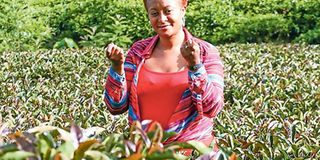Purple tea offers diversity and more income for farmers

Njeru Industries Tea Estate's humans resource manager Roseline Njoki Njeru on the company's purple tea farm. The production of purple tea in Kenya is low because only a few farmers are involved. PHOTO | FILE | NATION MEDIA GROUP
What you need to know:
- Over 96 per cent of the tea is produced and exported as black tea, mostly for blending with low-quality teas from other countries, making farmers earn less.
- Purple tea grows well in the highlands at an altitude of 1,500-2,500m above sea level, is resistant to drought, frost, pests and diseases, has a wide adaptability and is hardy against root-knot nematodes.
- The main export market is Japan, and others include the US, Germany and China. Despite the reduction in the price of ordinary tea, the price of purple tea is increasing.
- According to Kippra, most farmers do not want to adopt purple tea production because of lack of income when they uproot their black tea bushes and establish the purple ones, which take three years to mature.
Kenya is the largest tea-producing country in Africa and is ranked third in the world after China and India.
Tea plays a major role in the country's economy, as it is the third-largest foreign exchange earner, behind tourism and horticulture, and employs about four million people.
Over 96 per cent of the tea is produced and exported as black tea, mostly for blending with low-quality teas from other countries, making farmers earn less.
Purple tea was developed by the Kenya Tea Research Institute in 2011, leading to an increase in the competitiveness of produce from Kenya. The crop has purple leaves that are rich in anthocyanin.
Purple tea grows well in the highlands at an altitude of 1,500-2,500m above sea level, is resistant to drought, frost, pests and diseases, has a wide adaptability and is hardy against root-knot nematodes.
It is high-yielding, with the yields being 10 times higher than those of processed green tea. According to the Kenya Institute for Public Policy Research and Analysis (Kippra), Kenya exports about 60 tonnes of purple tea to Japan, China, North America and Europe.
The main export market is Japan, and others include the US, Germany and China. Despite the reduction in the price of ordinary tea, the price of purple tea is increasing.
In the local market, a kilo goes for Sh2,600, which is 10 times higher than green tea that sells for an average of Sh200. The yield per bush is 1.5-3kg per year.
A FEW FARMERS INVOLVED
The production of purple tea in Kenya is low because only a few farmers are involved. Currently, there are over 700,000 small-scale farmers involved in its production.
According to Kippra, most farmers do not want to adopt purple tea production because of lack of income when they uproot their black tea bushes and establish the purple ones, which take three years to mature.
Therefore, despite the economic and health benefits of purple tea, the adoption still remains low. Additionally, purple tea requires specialised plant equipment and technical know-how.
Kangaita Tea Factory in Kirinyaga County is one of the few firms that can process purple tea. Marketing may be another challenge both locally and internationally as most people only know black tea. There is lack of knowledge on the existence of purple tea, and therefore its consumption is low.
Purple tea has a lot of health benefits. Its high levels of anthocyanin help to reduce hypertension and cardiac failure, aids in weight loss, has anti-ageing properties, low caffeine, helps prevent hair loss, evens out skin tone and has anticancer, antiviral and anti-inflammatory properties.
here is a need for aggressive marketing of purple tea to increase awareness and lead in rise in consumption to boost demand and motivate more farmers to grow it. With stiff competition in the global market for black tea, speciality products like purple tea will do well.
The writer is based at the Department of Crops, Horticulture and Soils, Egerton University.




